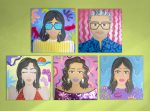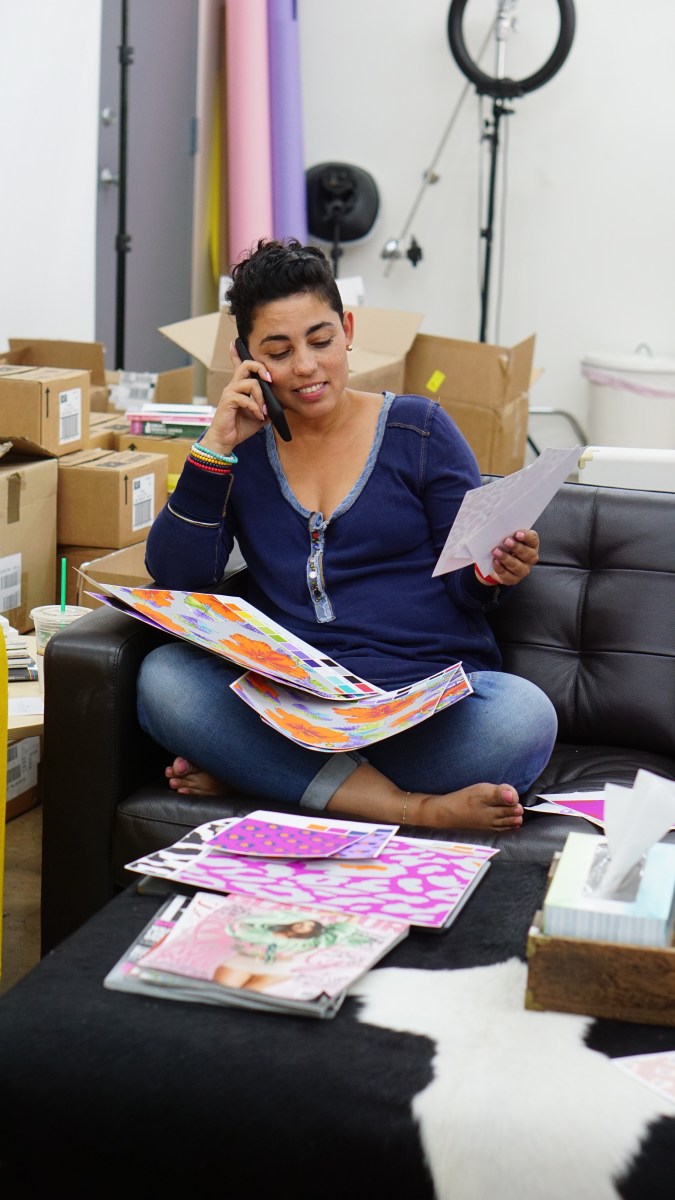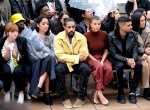Latina entrepreneur Mimi G is tired of the lack of diversity in the craft and fashion industries, so she’s doing something about it. Specifically, Mimi Goodwin Ford is asking companies—including Jo-Ann’s, Hobby Lobby and Michaels—why they haven’t publicly supported the Black Lives Matter movement. In doing so, Ford is also drawing attention to the obvious opportunities they all have to be more inclusive in everything from advertising to collaborations.
The mogul is the mastermind behind a multi-million dollar DIY sewing empire. Over the last eight years, she’s become one of the most influential women in the DIY fashion industry. The Puerto Rican created the world’s top virtual sewing school, Sew It Academy and shares free tutorials of her trendy sewing patterns—seen on everything from business wear to swimsuits.
Earlier this year, Ford was fed up when she saw the lack of major craft brands supporting the Black Lives Matter movement and was already frustrated by the lack of BIPOC representation in catalogs. She refused to be silent and complacent.
“I call out sh*t I see that’s racist. I’m calling out companies that I’m under contract with and [have been] willing to walk away from those contracts,” she tells Remezcla. “If you don’t speak up and educate then you are failing everyone.” Beyond common decency, Mimi’s devotion to raising awareness about justice and equality is personal. Her family is Afro-Latine and she knows all too well what it’s like to fear for the safety of her Black children and husband.

She took to her Instagram account, which has nearly 350K followers, to call out Simplicity Patterns (who she’s been under contract with since 2014) for their lack of solidarity during the protests. This was a major risk, but she said she, “didn’t feel it was courageous or brave. I just thought it was right.”
She was soon contacted by the CEO of Simplicity, who called her in for a meeting and promised change. We spoke with Goodwin Ford about what motivated her to call brands out for their lack of support, how the meetings have gone with brands that responded and the importance of diversity in the craft industry.
How did the meeting with Simplicity Patterns go?

It went as I expected, I have a long history with them and so they were open to listening and understanding what they were doing to contribute to the lack of diversity but I also know it’s a process and not everything can change immediately. Do I think everyone I spoke to gets it? No, I don’t. My job is to keep using my voice and platform until change starts to happen.
We talked about programs that can be put in place to help support Black Makers, we talked about using women that look like us to be used in photography and advertising, we talked about hiring and placing people of color in key roles and how to be inclusive in their social media posts. I’ve seen some of these take place already and others will take time to implement. I’m still watching and lending my voice when needed.

What motivated you to use your platform to voice to raise awareness about Black Lives Matter and call brands out for their lack of diversity?

Well, as the leader of the DIY community, I knew that I couldn’t sit by and watch what was taking place and not lend my voice to it. I didn’t need much motivation to speak out. As I sat there watching brands stay silent amid everything that was going on, I knew that I had a responsibility to call them out and ask for an explanation. I have always been very transparent with my followers so it was only right that I call out all the brands that were not participating, including those I had relationships with.
How do you feel these brands can become more diverse?
I see many of the brands especially in my industry reaching out to influencers of color, but it feels somewhat self-serving, like: ‘Oh, let me align myself with the Black and Brown community now.’ This is good and bad. It gives a lot of influencers that may have otherwise been overlooked a chance to partner and generate revenue. But, it also helps the brands look inclusive when in fact nothing is happening at the back end of these companies. To be inclusive you have to start at the core and that means making sure the executive teams that make the decisions are diverse.

There needs to be actual conversations on how to collaborate and support all their customers. There’s a lack of diversity in advertising, paid collaborations, sizing and mainly acknowledgment.
Why is it important to you to support inclusive brands?
It’s important because I’m a woman of color, and if I am going to spend my hard-earned money I want to make sure it’s with companies that sees, acknowledges, and understands how vital I am to their success.

Why is it important to you to support the Black Lives Matter movement?
It’s important for all of us to support the BLM movement but as a Latina, I’m fully aware of my “‘light-skinned’ privilege. I know that my fair skin and ‘passable’ look has afforded me opportunities that a Black woman or man or even a dark skin Latinx may not get because of their skin color.
This happens within Latinx communities. We’re conditioned even in our own families to think that lighter is prettier and so unless our Black brothers and sisters are freed from systematic racism, we won’t ever be. It’s time to take a look at ourselves and acknowledge the lack of support we have shown over the years and start making those changes within our households.
“Posting a black box or using a BLM hashtag isn’t enough, it’s going to take many conversations.”
What has it been like for you as an influencer of color to educate the corporate brass within Fortune 500 companies about diversity?
It puts a bit of pressure on me because I’m speaking for such a large group of people, but I’m up for it. Posting a black box or using a BLM hashtag isn’t enough, it’s going to take many conversations. Companies need to reevaluate their hiring practices, their executive teams, their promotion tactics, their marketing campaigns, their social media postings, and take a look at whether or not their mission statement speaks to equality and serving the communities that support them.
It’s been eye-opening and in some cases refreshing. The bottom line is that some brands have no idea what they’re doing and what they’re lacking. It comes down to education. Can we say they are blissfully unaware? No. But, there’s an opportunity to sit at these tables and share my opinions and ideas on how they can be better.
I sometimes feel like ‘why are we still having to talk about this in 2020?’ The sad truth is that these practices have been in place for so long. If you’re running a company and have no one of color in boardrooms to speak up and guide the conversations toward inclusivity then we’ll continue to talk about the same issues over and over again. In some cases, there has been acknowledgment and openness to make real change and in other cases, I can tell they don’t get it and are trying to pacify the situation.
How are you keeping your Afro-Latino family feeling safe, healthy, and positive in this difficult time?
We have a lot of conversations in my household, my children are very much aware of the fears I have for them when they leave my house but they’re also aware that there is still a lot of love and support in the world. We encourage open dialogue and promote a safe place to share their feelings and that’s the best we can do. I hope that my life has served as an example that all things are possible through hard work and that kindness and tolerance are so important to the continued growth of this country.




